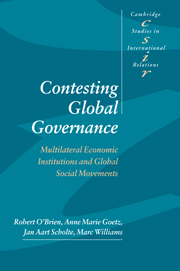Book contents
- Frontmatter
- Contents
- Preface
- List of abbreviations
- 1 Contesting global governance: multilateralism and global social movements
- 2 The World Bank and women's movements
- 3 The World Trade Organization and labour
- 4 The World Bank, the World Trade Organization and the environmental social movement
- 5 The International Monetary Fund and social movements
- 6 Complex multilateralism: MEIs and GSMs
- References
- Index
- CAMBRIDGE STUDIES IN INTERNATIONAL RELATIONS
2 - The World Bank and women's movements
Published online by Cambridge University Press: 22 September 2009
- Frontmatter
- Contents
- Preface
- List of abbreviations
- 1 Contesting global governance: multilateralism and global social movements
- 2 The World Bank and women's movements
- 3 The World Trade Organization and labour
- 4 The World Bank, the World Trade Organization and the environmental social movement
- 5 The International Monetary Fund and social movements
- 6 Complex multilateralism: MEIs and GSMs
- References
- Index
- CAMBRIDGE STUDIES IN INTERNATIONAL RELATIONS
Summary
This chapter examines the ways in which women's movements have engaged with the World Bank in order to challenge the neoliberal economic development paradigm which the Bank promotes, and which some feminists claim is responsible for accelerating rates of female immiseration in developing countries. Feminist critiques have made inroads at the World Bank in terms of diverting some development resources to support women's education, health, and access to micro-credit. But the feminist critique has barely grazed neoliberal prescriptions for market led economic growth in spite of evidence that failures in economic reform policies and structural adjustment have been caused in part by ignorance about the ways gender affects household level responses to production incentives. The outcomes of engagement between women's movements and the World Bank reflect on characteristic features of the Bank's institutional culture, cognitive framework, and decision-making structures which make it relatively indifferent to the gender justice and equity argument. Outcomes of this engagement are also shaped by characteristic features of women's organisations which have, until recently, limited their capacity for building global coalitions around women's economic rights.
The World Bank: what it is, what it does, how it works
The World Bank is the world's biggest development bank, providing finance, research and policy advice to developing countries, with an annual turnover in new loan commitments to developing nations of over $20 billion.
- Type
- Chapter
- Information
- Contesting Global GovernanceMultilateral Economic Institutions and Global Social Movements, pp. 24 - 66Publisher: Cambridge University PressPrint publication year: 2000

